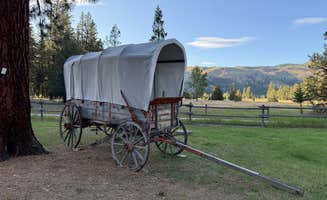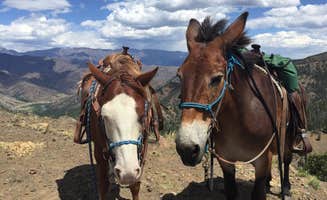Equestrian camping options near Missoula, Montana provide access to the region's extensive trail systems including parts of the Lolo National Forest and Bitterroot National Forest. The area sits at elevations between 3,200 and 7,000 feet with summer temperatures typically ranging from 45°F nights to 85°F days. Weather conditions can change rapidly in this mountainous region, with afternoon thunderstorms common during summer months.
What to do
Hike to scenic waterfalls: At Holland Lake Campground, trails lead directly to Holland Falls. "The hike to the Holland Falls is short but totally worth it! Clean lake perfect for swimming and paddleboarding," notes Talia H. The trail is suitable for beginners but requires caution near the falls.
Fish in mountain lakes: Multiple campgrounds offer fishing access. "Great backcountry airstrip. Easy to catch cutthroat and solitude," says William S. about Fish Lake Trailhead. The area's lakes and streams support populations of cutthroat, brown, and rainbow trout.
Tube down rivers: Some campgrounds facilitate river recreation. "They even provided a shuttle up and down the river so we could tube!" reports Reames C. Bring personal flotation devices and check water conditions before tubing, as currents can be strong during spring runoff.
What campers like
Spacious sites with privacy: Campers frequently mention site layout as a key factor. "Sites varied in size and shape and shade. I like the sites on the far side of the loop as they are closer to the creek and away from the dusty road," notes Annie C. Most sites have ample room for tents, vehicles, and outdoor setups.
Wildlife viewing opportunities: The area supports diverse wildlife. "Keep an eye out for bears. We saw a black bear across the road from the campground," warns Sara D. at Holland Lake Campground. Practicing proper food storage is essential for safety.
Clean facilities: Many campsites maintain well-kept amenities despite remote locations. "The bathrooms were clean, as well as the sites," reports Thomas C. Vault toilets are standard at most established campgrounds, with some offering additional water spigots and trash collection.
What you should know
Bear safety is critical: Both black and grizzly bears frequent the area. "There are both black and grizzly bears that frequent this area daily, so be very careful with your food, and bear aware when hiking. My last stay was only 2 nights, and I ran into two bears, one that strolled right by my trailer," cautions Carmen H. Carry bear spray and properly store all food and scented items.
Limited cell service: Connectivity is minimal throughout the region. "The closest cell service is just outside of Seeley Lake," mentions Sara D. Download maps and campground information before traveling to remote areas.
Seasonal challenges: Each season brings different conditions. "Mosquitoes were pretty bad in early July," notes Carl H. Mosquito repellent is essential during summer months, while shoulder seasons require preparation for variable temperatures.
Water notices occasionally in effect: Some campgrounds experience water quality issues. At Ekstrom's Stage Station Campground, Andrea B. reports: "Staff provided jugs of water due to the water boil notice, but we would have preferred a discount from the $53 charge for our no water / no electric site."
Tips for camping with families
Playground access: Select campgrounds feature play areas for children. "There is a big field next to the river that was great for kids to run around in," shares hanaa about Bearmouth RV Park. Similarly, Ekstrom's Stage Station offers "a sweet playground, really cute buildings, and a little walk down to Rock Creek."
Short hiking trails: Look for campgrounds with beginner-friendly paths. "Our daughter braved a chilly swim and there were lots of dirt roads and little trails for the strider bikes," says Sara D. These shorter trails provide accessible outdoor experiences for younger children.
Noise considerations: Highway proximity affects some campgrounds. "Interstate noise and the occasional train whistle would keep me from using the facility for nothing more than an overnight stop," notes Tadd B. For longer family stays, select campgrounds further from major roadways.
Tips from RVers
Site selection for larger vehicles: RV access varies significantly between campgrounds. "Sites are close-ish together but very private because of the tree cover. The creekside sites are especially lovely," advises Jess W. about Charles Waters Campground. Many campgrounds have a limited number of sites suitable for larger rigs.
Leveling challenges: Prepare for uneven terrain. "Campground is clean, sites are well spaced, parking pads are pretty flat and big," notes steve D., though other reviews mention slope issues. Bring leveling blocks and stabilizers, especially for longer vehicles.
Paved access considerations: Road quality affects the camping experience. "Paved roads, large sites, (sloped, not level) very friendly hosts, water spigots throughout, pit toilets, cement picnic tables," describes MT Nesters 4. Paved access makes travel easier during inclement weather but doesn't guarantee level sites.



